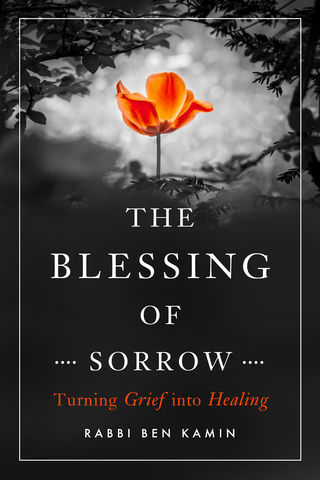Grief
The Blessing of Sorrow: Turning Grief Into Healing
The Book Brigade talks to Rabbi Ben Kamin.
Posted June 7, 2018

A culture that focuses on youth provides no guidance or support for those who grieve over a death. Yet it is an experience everyone can be guaranteed to face.
What led you to write a book about sorrow?
The memorial process and the therapy of useful grieving have always touched me. This is a raw and unpredictable, yet potentially redeeming journey for each of us. Nothing else–like this–is shared by all who live. Death is a kind of magnificent tyranny: it is uncompromising, it hurts us viscerally, and yet it reveals a great deal about ourselves. Grief is a given that I have dealt with professionally for over 40 years as well as directly; I wanted to share my experience and insight. I also have written the book due to my serious concern that many Americans simply bypass or defer grief—an unfortunate practice that almost always creates depression, trauma, or even dysfunction within several weeks of the event that occurred without closure. We have a youth and gossip culture that has cultivated a disconnection with the realities of death—let alone a dismissal of our elderly in their most anguishing and lonely time. I wrote this book because grieving is a deeply critical aspect of human life and it must be embraced unswervingly.
The mental health establishment deems two weeks a sufficient period of grief, after which sorrow is diagnosable and treatable as a mental disorder. Does that square with your understanding of the way grief works?
It absolutely does not. Grief is personal, it has no clock, and its passage is unique to the person in bereavement. I don’t think it’s a mental disorder. It’s a mental and spiritual journey filled with pain and anguish. It is as strong exactly equal to how much we loved somebody. Clinical therapy may be sought by some in mourning, but there is no set timing dimension for this.
Is there a natural arc to the grieving process?
I don’t think there’s an arc. We are crossing a bridge—from sorrow to healing. How we walk across the bridge, steady and standing or perhaps on our knees sometimes, is an individual situation. The only arc is the one set over life and death themselves.
Does everyone grieve the same?
Absolutely not. It’s based upon a person’s prior responses to mortality, whether they internalize or externalize difficult emotions, to what degree they are connected to a faith community, and other personal/history factors. And we are not to judge them; we are to help them.
What do people misunderstand most about grief/sorrow?
That it is an indispensable response to the hardest crisis we know in this life.
What do you consider the biggest blessings of sorrow?
It grows us. It strengthens us. It makes us cherish life and value people like nothing else does.
How do people defer grief and who does that and why?
People sometimes act unnecessarily stoic and camouflage their true feelings and pain in favor of denial and just “celebrating” a life. That’s fine—if the harshness and reality of the reality at hand are not consumed by this tendency. We need to walk through the process of bereavement; there is no way around it.
What is the problem with deferring grief?
As I once experienced (and this is shared in the book): After a significant loss, I fell into bravado and disavowal about the bitter grief I felt. The result, a few months later, was the nightmare of a deep depression that required medical intervention. Deferring grief all too often sets free demons that turn our souls to shreds.
Are there things people can do to help the grieving process?
There is one key thing: submit! Acknowledge the pain, lean into the sorrow, and then create a recovery process that is in sync with the way you plan to grieve.
Do you find that some people are afraid of grieving, afraid to "give in" to their feelings?
Yes, and this is a notably American phenomenon. Again, we are a gossip/vanity/youth-worshipping culture and many of us simply can’t accept the grim realities—and responsibilities—of bowing to the therapy of grief.
Death doesn’t end a relationship in all ways, does it?
Not at all. In fact, death is a chance to visit with somebody even though they have physically left us. Our dead, if embraced spiritually (not necessarily religiously), can inform lives and remain lighthouses for us as we confront the future.
Isn’t it normal to have “conversations” with the dead—after all, we often have silent conversations with the living?
In fact, almost everyone hears from and/or talks to their dead. This connection to our beloveds is perfectly normal and it is the one thing that never dies.
If you had one piece of advice, what would it be and for whom?
For all: Pre-plan the memorial service! This is a very calming and accommodating program that leaves the bereaved with direction, guidance, and the reassurance that they are following the funeral wishes and expectations expressed specifically by the now-deceased. It spares the family members a huge and confusing and stressful run-around and/or argument about what to do, what funeral options to purchase, and how the service will be realized spiritually. And it is significantly less costly—and candidly–denies the funeral professionals the opportunity to take financial advantage of the freshly-bereaved survivors. Above all, when it can happen, it gives our loved one who is pre-planning the service his or her voice.
About THE AUTHOR SPEAKS: Selected authors, in their own words, reveal the story behind the story. Authors are featured thanks to promotional placement by their publishing houses.
To purchase this book, visit:
The Blessing of Sorrow: Turning Grief Into Healing





